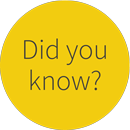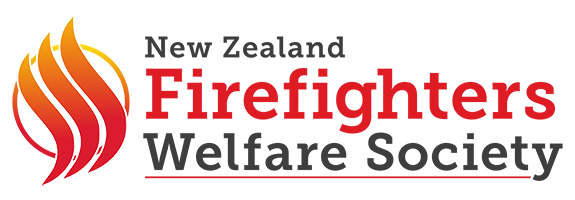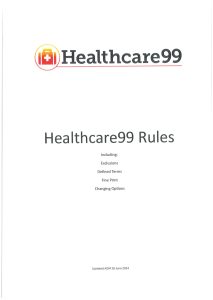| TERM |
DEFINITION |
| ACC |
Means the Accident Compensation Corporation, set up by the New Zealand Government to provide comprehensive, 24-hour, no-fault personal injury cover for all New Zealand residents and visitors to New Zealand. Accident Compensation Corporation being a crown entity established by the Accident Compensation Act 1972 or its successor under any subsequent legislation. |
| Accident |
Means a violent, external and visible event that results in physical Injury. |
| Acupuncture |
Means Treatment by an acupuncturist registered with the Acupuncturist Board of New Zealand (or its successor). |
| Alternative Treatment Provider |
A provider who practises in Alternative therapies which reside outside medical science. This includes but is not limited to Traditional medicine and Holistic medicine providers. |
| Bankruptcy/Bankrupt |
Means a situation where the member, is adjudged Bankrupt in Australia or New Zealand. |
| Care Provider |
Means an employee whether indirectly or directly employed by a Private or Public Hospital. |
| Chiropractor |
Means Treatment by a Chiropractor registered with the Chiropractic Board of New Zealand (or its successor). |
| Chronic |
Cystic fibrosis, polycystic kidney, Marfans syndrome, Loeys-Dietz syndrome, spina bifida, scoliosis, kyphosis, pectus excavatum and pectus carinatum. |
| Condition |
Means any Injury, illness or disease which would have caused any ordinary prudent person to seek treatment, diagnosis, care, medical advice or treatment. |
| Congenital |
Means a non-acute medical condition, disease or physical abnormality present from birth, whether it was recognised or diagnosed at birth or not. |
| Cosmetic |
Any elective or cosmetic investigation, procedure or any surgery, or treatment that improves, alters or enhances appearance, whether or not undertaken for medical, physical, functional, psychological or emotional reasons and there is no medical necessity for the investigation, procedure or any surgery, or treatment to occur. |
| Criminal Act |
Means participation in an action that constitutes an offence under the Crimes Act 1961 (or its equivalent in the country that the crime was committed if that country is not New Zealand), whether or not that action results in a conviction on indictment or on summary conviction. |
| Diagnostic Procedures |
Means investigative procedures ordered by a Medical Doctor to diagnose a medical condition. |
| Hospice |
Means any facility or home providing care for the sick or terminally ill. |
| Endorsement |
Means the amended terms and conditions of the policy. The endorsement will override any other terms issued on the Healthcare 99 Plan. |
| Hospital |
Means any facility or home providing care for the sick or terminally ill. |
| Illness |
Means any sickness or disease, which has not been caused by an Accident. |
| Injury |
Means a physical impairment which has been caused by an Accident. |
| Lawyer |
Means a Lawyer who holds a current practising certificate in New Zealand as a barrister or a barrister and solicitor. |
| Medical Doctor |
Means any medical practitioner registered with the New Zealand Medical Council as being able to practice medicine in New Zealand, holds a current practising certificate, and is working within the New Zealand Medical Council stated scope of practice (or the Australian equivalent). That person must not be:
- You, your business partner, or a member of your immediate family
|
| Medically necessary |
Means a service, treatment or procedure where without that service, treatment or procedure, the member’s physical health will not improve and may lead to further deterioration in their physical health. |
| Medsafe |
Means the New Zealand Medicines and Medical Devices Safety Authority. It is a business unit of the Ministry of Health and is the authority responsible for the regulation of therapeutic products in New Zealand. |
| Medical Treatment |
Means a course of prescribed medicine or a therapeutic procedure required to treat, arrest or cure a medical condition. |
| Nurse Practitioner |
Means any nurse registered with the Nursing Council of New Zealand who holds a current practising certificate as a Nurse Practitioner, and is working within the Nursing Council of New Zealand stated scope of practice (or the Australian equivalent). That person must not be:
- You, your business partner, or a member of your immediate family
|
| Oral Surgeon |
Means a person registered with the Dental Council of New Zealand and who holds an Annual Practising Certificate qualified in this surgical specialty (or the Australian equivalent). |
| Osteopath |
Means Treatment by an osteopath registered with the Osteopathic Board of New Zealand (or its successor). |
| Pallative |
Means a drug or medical treatment that reduces pain without curing the cause of the pain. |
| Pharmac |
Means the Pharmaceutical Management Agency of New Zealand which manages funding of community pharmaceuticals on behalf of the District Health Boards. The Pharmaceutical Management Agency being a Crown entity established by the New Zealand Public Health and Disability Act 2000 or its successor under any subsequent legislation. |
| Physiotherapy Treatment |
Means treatment by a physiotherapist registered with the Physiotherapy Board of New Zealand (or its successor). |
| Pre-existing condition |
Means Any disease, injury or medical condition for which, prior to the risk commencement date, the member knew they had or should on reasonable grounds to have known they had, or for which they had experienced a symptom, consulted a registered medical practitioner or alternative treatment provider, received treatment or services from a registered medical practitioner or alternative treatment provider or took prescribed drugs or medication. |
| Private Hospital |
Means any registered hospital not administered, operated, controlled, or funded by any District Health Board established by or under Section 19 of the New Zealand Public Health and Disability Act 2000 or any subsidiary of such a District Health Board (or the Australian equivalent) including Day Stay Facilities. |
| Prophylactic Procedures |
Means Procedures undertaken as preventative measures that do not improve the members physical health. |
| Reasonable charges |
Means Charges, costs and fees that The Trustees have determined are reasonable for the treatment, procedure, consultation, test, diagnostic imaging or care when carried out. |
| Registered Nurse |
Means any nurse registered with the Nursing Council of New Zealand who holds a current practising certificate as a Registered Nurse, and is working within the Nursing Council of New Zealand stated scope of practice (or the Australian equivalent). That person must not be:
- You, your business partner, or a member of your immediate family
|
| Specialist |
Means any health provider who is a Member or Fellow of an appropriately recognised Specialist college and has Medical Council of New Zealand vocational registration in the speciality that directly relates to the medical condition suffered by the member, in the Trustees sole opinion (or the Australian equivalent). That person must not be:
- You, your business partner, or a member of your immediate family
|
| Surgery |
Means an invasive procedure, which involves physical intervention on human tissues involving cutting of a patient’s tissues or closure of a previously sustained wound. Surgery would be expected to require the use of a sterile environment, anaesthesia or sedation, antiseptic conditions, the use of surgical instruments and suturing or stapling. |
| Trustees |
Means any person appointed as Trustee pursuant to Rule 16 of the New Zealand Firefighters Welfare Society rules. |
| Welfare Society |
Means New Zealand Firefighters Welfare Society registered under the Friendly Societies and Credit Unions Act 1982. |





